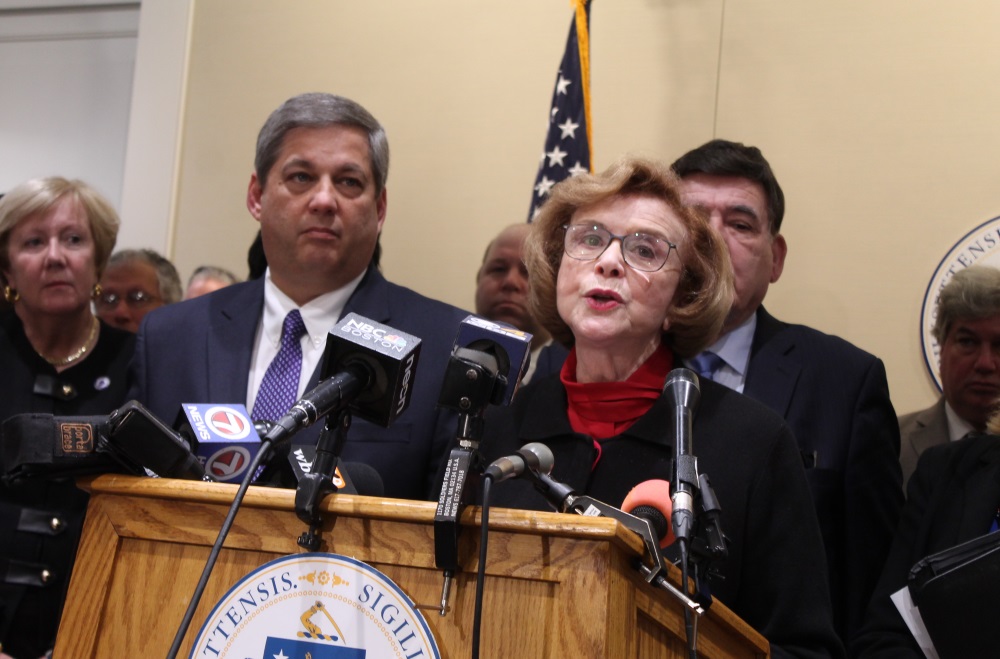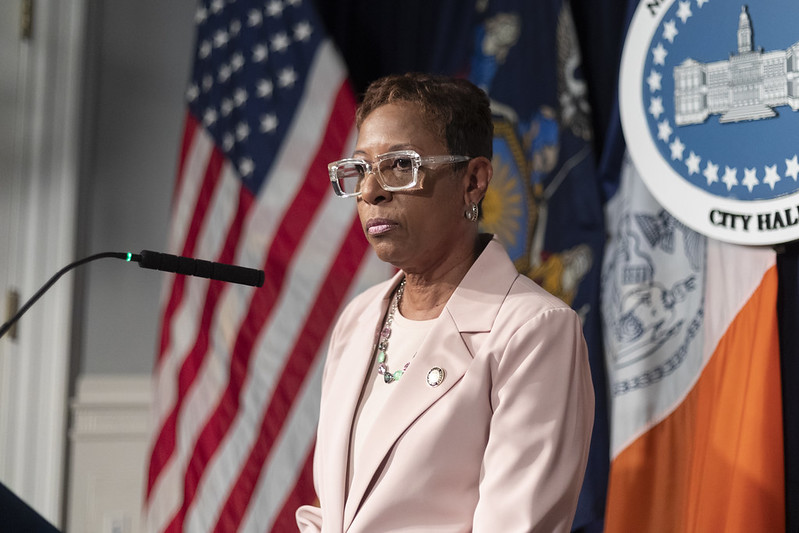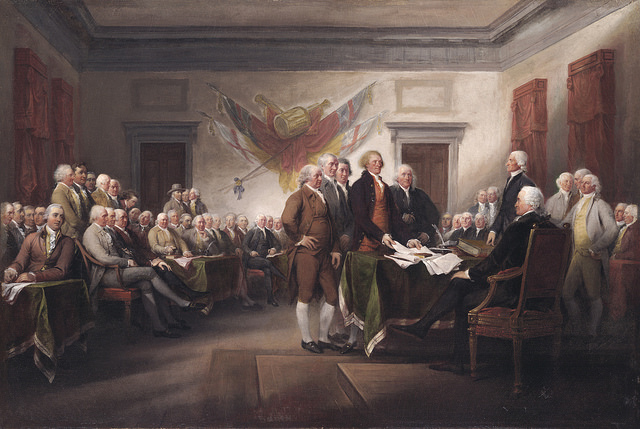The Senate initiated an Ethics Committee investigation on Monday night into its now former president Sen. Stanley Rosenberg in a dramatic day of upheaval that saw Worcester Democrat Harriette Chandler installed as the new acting Senate president pending the outcome of an investigation into sexual harassment and Senate interference by Rosenberg’s husband.
The election of Chandler, Rosenberg’s top lieutenant, and the adoption of an order green-lighting the Senate Ethics Committee investigation marked the culmination of a marathon day of closed-door talks between Democrats and Republicans.
Chandler emerged as the unanimous choice of Democrats to take over the Senate temporarily after Rosenberg announced in the morning that he wanted to take a “leave of absence” from his leadership duties to ensure a “fully independent and credible” investigation.
“Choices had to be made and today we’ve chosen to move on and to move forward,” Chandler said. “What’s most important right now is that we work towards a swift and resolute conclusion to this whole sad event.”
Senators also said they welcomed a possible criminal investigation into the allegations published last Thursday in the Boston Globe, which reported that three men who do business on Beacon Hill were allegedly groped by Hefner and a fourth was kissed against his will. Those men also claimed that Hefner boasted about influence he wielded over Senate policy decisions.
Attorney General Maura Healey and Suffolk County District Attorney Dan Conley said they hoped victims or witnesses to the harassment and assault would come forward.
“We have a very fully formed criminal justice system to address the serious concerns that have been brought forward by the people who have alleged that they have been victims and we would encourage folks to take full advantage of that criminal justice system to seek redress for acts that might have occurred that are much beyond the ability of the Senate to offer any remedy,” Senate Minority Leader Bruce Tarr said.
The Ethics Committee, which is chaired by Sen. Michael Rodrigues of Westport, plans to convene at 11:30 a.m. on Tuesday when they are expected to begin the process of hiring an independent investigator to conduct the probe.
The investigator, according to the order, will be directed to look into “the conduct of Senator Stanley C. Rosenberg and whether he violated the rules of the Senate.” The investigator is to have “full access” to the Rosenberg’s office and his staff, and the Ethics Committee was authorized to compel witness testimony and the production of “books and papers and such other records” by summons, per the order adopted Monday night by the Senate.
Unless they specifically agree to be identified, the identity of anyone who provides information to the Senate’s special investigator is to remain confidential, and the investigator is to return a report and recommendations to the Ethics Committee “as soon as practicable.”
“One of the mistakes that anyone can make with an investigation is to try to limit it in too many ways. This investigation needs to take as long as it takes and it needs to go where the facts take it,” Tarr said.
That open-ended timeline could signal a long period of uncertainty about the outcome of the probe, Senate leadership considerations, and the impacts on the policy agenda of Democratic House and Senate leaders – the branches plan to resume formal sessions in January, with many pressing matters on the agenda.
Chandler, as the Senate majority leader, was a senior member of the leadership team assembled by Rosenberg, who agreed Monday to take the step of relinquishing the presidency while the Senate investigation unfolds.
Asked whether she was resolved to step down as acting president upon the completion of the Ethics Committee investigation, Chandler said, “I am resolved to do so.”
What that means for Rosenberg and the future of Senate leadership remains unclear, since the results of the investigation will prove influential and it appears other senators are poised to seek the presidency. Rosenberg said last Friday that he is confident an investigation will show that Hefner, who is planning to seek treatment for alcohol dependence, had no decision-making role in the Senate.
Chandler said she did not yet know whether Rosenberg would be given committee assignments or other duties such as those assigned to senators, whether Rosenberg would give up the physical office of the president, or if she would accepted the additional salary that comes with being president.
“I wish to reemphasize that the most important thing is to make sure that anyone who may have been hurt has every assurance that they can turn to whatever authority they feel comfortable with, with absolutely no fear of retribution, and to restore confidence in the Senate. During my leave of absence from being Senate President, I look forward to a thorough, fair, and independent investigation. I thank my colleagues for providing this opportunity and have every confidence that the Acting President will help the Senate focus on a robust agenda for 2018,” Rosenberg said in a statement.
Chandler, 79, of Worcester, is the second woman to serve as Senate president, following former Senate President Therese Murray of Plymouth.
The four days since the Boston Globe published an explosive report about Hefner’s alleged assaults have been “so turbulent, so tragic, so surprising and so sad,” Chandler said.
“We hear the victims of these allegations. We admire their courage in coming forward. No one who serves, works or does business in the Massachusetts State House should feel unsafe, coerced, or unsupported,” she said.
The day started with many questions about Rosenberg’s ability to cling to power and speculation swirling about whether four senators jockeying for poll position to succeed Rosenberg could muster the votes to replace him.
Sen. Linda Dorcena Forry, who entered the day as someone many believed could become the next Senate president, said after the caucus that she did not believe that’s Rosenberg return to the presidency at the conclusion of the investigation was a foregone conclusion.
“We thought as a body that it was important to put in an interim Senate president and that is what we’re doing until the report is complete, and then we will have to regroup again as a body to decide how do we move forward,” Forry said.
Asked if she would be interested in filling the presidency, Forry said, “We will have to see how it goes, but I think I am excited about us coming together today, though very sad because the Senate president has put forth a really aggressive agenda that we all believe is important in uplifting communities and families and we’re going to continue to push through and make sure that gets done.”
Earlier in the day, Tarr said he thought that once Rosenberg steps aside, even temporarily, it may become difficult for him to return to power.
“I thing it’s generally very hard for someone to return after an absence. Certainly within the realm of possibility, but I think it would be difficult,” Tarr told the News Service.
Sen. Eric Lesser said there was “broad consensus” behind Chandler as the right person to lead the body “as we navigate what’s really uncharted territory for the Senate,” despite Sen. Richard Ross, a Wrentham Republican, saying the length of the private talks was due to “a lot of dissension among members” of the majority party.
Lesser said the roughly eight-hour caucus took the time it did because nearly 40 people needed a chance to share their thoughts, “and then we worked together on a path forward.” “She’s universally respected,” Lesser said of Chandler. “She has my full faith and confidence and I know the full faith and confidence of this body as well.”
On their way into the evening’s formal sessions, some Senate Democrats offered differing answers when asked if they’d considered appointing a permanent president to fully take over from Rosenberg, rather than naming someone to the job on an acting basis.
“At this point we’re just considering the acting president,” said Sen. Sal DiDomenico, another of the four who had put out feelers about succeeding Rosenberg if he were to step aside.
Sen. Jason Lewis said “everything” was under discussion in the closed-door meeting.
“Obviously we were at it for a long time, so I think all options were thoroughly discussed, and I think what you heard from the majority leader and the minority leader was what we concluded was the best way,” Lewis said.
Sen. Cynthia Creem, one of the Senate’s three assistant majority leaders, said there was not discussion of a new permanent leader because Rosenberg was only taking a leave of absence from the post.
“At the end of the investigation, he may be Senate president again,” Creem said. Asked if she expected Rosenberg to return to the presidency, Creem said, “I don’t have a looking glass.”
While senators promoted the intense debate they held in caucus, there was no public debate on the momentous orders adopted on the Senate floor.

























